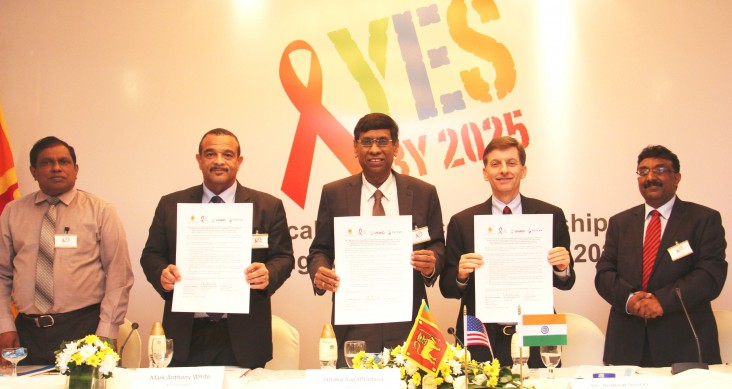You are viewing:
Archived Content
Information released online before January, 2021.
You are viewing:
Information released online before January, 2021.
Note: Content in this archive site is NOT UPDATED, and external links may not function. External links to other Internet sites should not be construed as an endorsement of the views contained therein.
You are entering the 2017-2020 Archive for the
United States Agency for International Development web site.
If you are looking for current information, visit www.usaid.gov.

On December 8, the Governments of Sri Lanka and the United States launched a two-year HIV/AIDS Technical Assistance Partnership to fast track government efforts to end AIDS by 2025. The U.S. Government’s development agency – U.S. Agency for International Development (USAID) - through the President’s Emergency Fund for AIDS Relief (PEPFAR), will help to transfer promising solutions, new technical skills and innovations to contribute towards ending AIDS in Sri Lanka.
“USAID Sri Lanka has been working closely with the Government of Sri Lanka on a number of social and economic development efforts. This partnership is very important as Sri Lanka moves down the path to ending the spread of AIDS.” Dr. Andrew Sisson, Mission Director, USAID Sri Lanka. Mark Anthony White, Mission Director, USAID India added that “USAID India is happy to partner with USAID Sri Lanka to support this important initiative to strengthen the HIV response, especially for key populations. We hope this leads to more health collaborations between India and Sri Lanka.” Also speaking at the launch, Mr. Janaka Sugathadasa, Secretary of Health, Ministry of Health said, “When it comes to HIV/AIDS, we must have a new approach. The public health approach has to be coupled with a societal approach.”
The two-year USAID partnership with Sri Lanka will work in close collaboration with key stakeholders in the country – National STD/AIDS Control Program (NSACP) Sri Lanka; the Global Fund to fight AIDS, Tuberculosis and Malaria (GFATM); and civil society organizations - to improve access to HIV/AIDS prevention, care and treatment services for at-risk or key populations (KP) due to their increased vulnerability for contracting/transmitting the HIV virus.
USAID assistance will support the design and roll out of KP-specific strategic behavior change communication materials and a social media communication strategy; HIV services through different KP-friendly community and clinic-based approaches, and improve HIV prevention and testing services through innovative solutions involving private medical practitioners and approaches to reach hidden KP groups.
The Government of Sri Lanka is committed to ending AIDS in country by 2025, ahead of the UN’s Global Commitment to end AIDS by 2030.
Comment
Make a general inquiry or suggest an improvement.